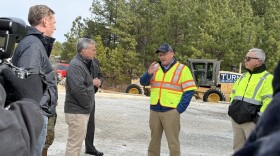Forecasters are monitoring a storm system that could produce more severe weather in central and eastern North Carolina this weekend.
The National Weather Service says there's an enhanced risk of damaging thunderstorms from Friday night through Saturday morning, especially in the Sandhills and eastern North Carolina.
Meteorologist Aaron Swiggett says the worst weather will likely develop overnight on Friday.
“Tornadoes, damaging wind, lighting — of course with any thunderstorm — will be our main threats,” Swiggett said. “And then even on the back end, we'll have some pretty freezing cold temperatures, so we'll have all manner of hazards to account for with this one.”
Swiggett says the dramatic drop in temperatures Saturday afternoon could produce some snow in central North Carolina, but it's not expected to stick around. Temperatures could dip as low as 20 degrees in the Triangle on Saturday night, and even a bit lower in the Triad and areas to the west.
A strong storm system will bring a risk for severe storms with damaging winds and isolated tornadoes Saturday morning esp in the far SE. Much colder air will pour in Sat afternoon with a bit of non-accumulating snow possible in the NE, and near record cold temps Sat night. #ncwx pic.twitter.com/iJihoeK0tQ
— NWS Raleigh (@NWSRaleigh) March 11, 2022
This late-winter storm — combining rivers of moisture and frigid temperatures — is expected to dump snow from the Deep South all the way north to the Canadian border over the weekend, forecasters said Friday.
With snowfall totals ranging from about 4 inches in northern parts of Alabama and Mississippi, to about 13 inches in northern Maine, the storm could cause travel problems and power outages across a wide part of the Eastern United States from late Friday through early next week.
The system is referred to by some as an ominous-sounding “bomb cyclone.” It's created by a rapid drop in air pressure — at least 24 millibars in 24 hours — and often is over or near oceans or seas because it requires warm moist air smacking into cold dry air, along with volatile weather from the jet stream.
“With this bomb cyclone, maybe what’s the biggest concern is how late in the season it's coming and that it’s traveling over inland areas,” said Judah Cohen, a winter storm expert for Atmospheric Environmental Research, a commercial firm outside of Boston.
It’s late in the season for bomb cyclones so this is likely the last one at least for the Southeast, maybe even the rest of the coast too, Cohen said.
The National Weather Service issued a winter storm warning from the Deep South to northern Maine.
Here's tomorrow's hour by hour forecast. It will be a mild start with the chance for severe storms between 4 and 9am. Tornadoes are possible with this strong line. On TV this afternoon we'll show you where the strongest storms may be.
— Elizabeth Gardner (@WRALweathergal) March 11, 2022
@wralweather@wral pic.twitter.com/Qj0wNlfhxW







